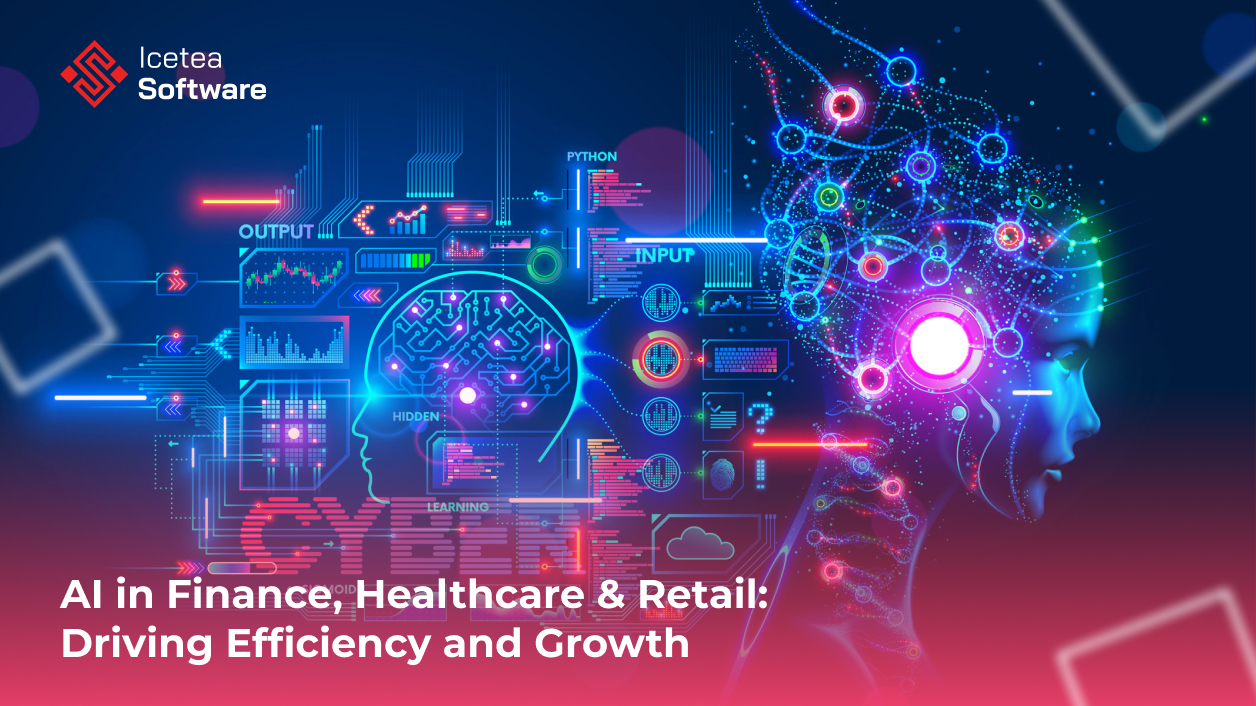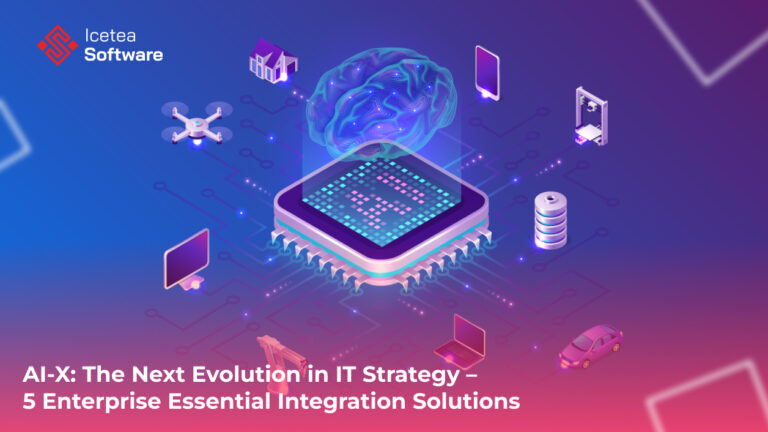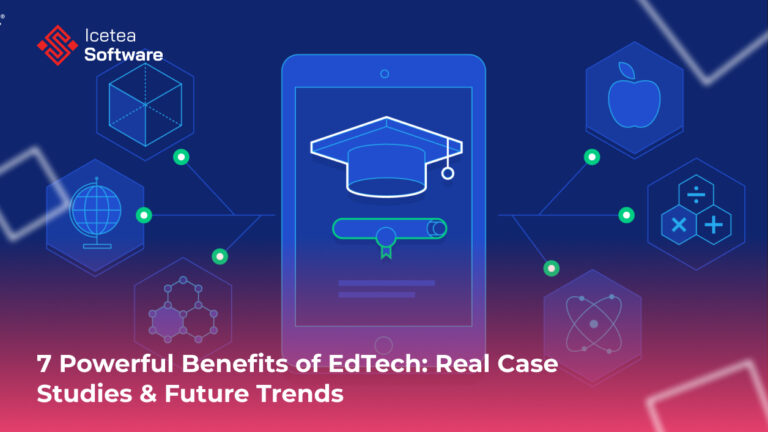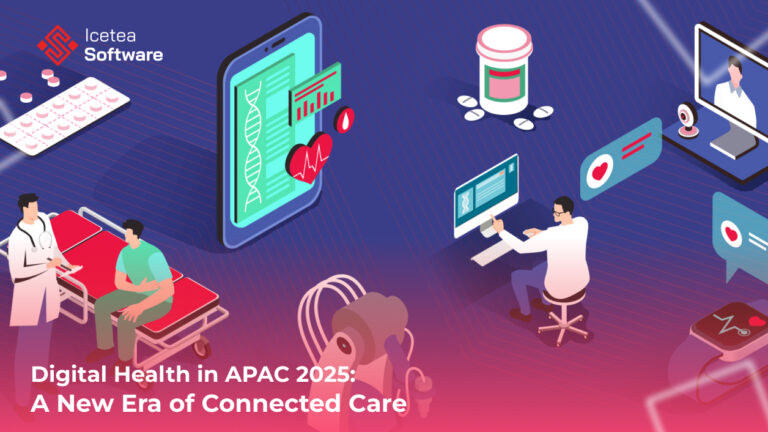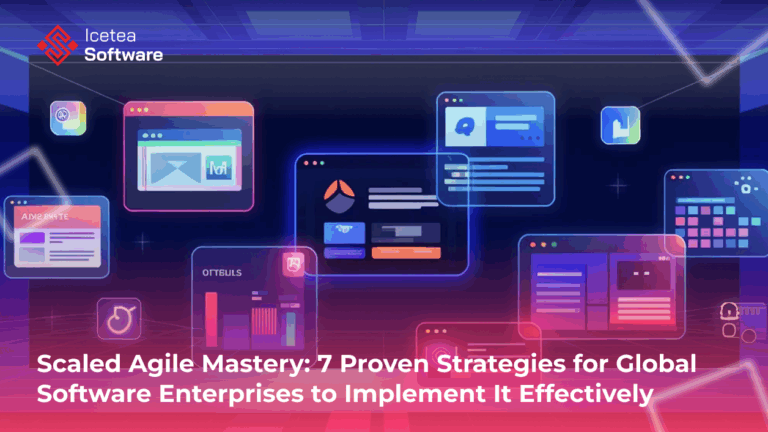AI in Finance, Healthcare & Retail: Driving Efficiency and Growth
- Understanding Efficiency in the Age of AI
- AI in Finance: Smarter, Safer, Faster
- AI in Healthcare: Precision Meets Productivity
- AI in Retail: Personalization at Scale
- Measuring the Impact of AI Efficiency
- Challenges and Risks
- Best Practices for Successful AI Deployment
- The Future of AI in These Sectors
- Final Thoughts
- About Icetea Software
Discover how AI in finance, healthcare, and retail can boosts efficiency and growth with smarter decisions, lower costs, and better experiences.
Artificial Intelligence (AI) has often been associated with robotics, assembly lines, and industrial automation. While factories were among the earliest adopters, AI’s role today stretches far beyond manufacturing. Three industries—finance, healthcare, and retail—are experiencing some of the most transformative impacts.
In these sectors, efficiency is not a buzzword; it’s a strategic imperative. Financial institutions must handle billions of transactions securely. Healthcare providers balance rising patient loads with limited resources. Retailers compete in a digital-first world where customer loyalty can shift with a single click. AI is helping organizations in all three domains to not only survive but thrive—by improving decision-making, reducing costs, and enabling faster, more personalized services.
This article takes a deep dive into how AI drives efficiency and growth in finance, healthcare, and retail. We will explore real-world applications, case studies, measurable outcomes, and best practices for organizations aiming to unlock AI’s full potential.
Understanding Efficiency in the Age of AI
Before analyzing sector-specific examples, it’s worth clarifying what “efficiency” means in today’s AI-driven context:
- Operational efficiency: Automating routine processes to save time and minimize human error.
- Cost efficiency: Reducing the resources needed to achieve the same or better results.
- Decision efficiency: Leveraging data-driven insights for faster and more accurate choices.
- Experience efficiency: Enhancing the quality of interactions with customers or patients.
AI contributes to all four, often simultaneously. For example, a predictive algorithm in healthcare can reduce diagnostic errors (decision efficiency), save time for doctors (operational efficiency), reduce hospital readmission costs (cost efficiency), and ultimately provide patients with faster, more accurate treatment (experience efficiency).
AI in Finance: Smarter, Safer, Faster
The financial sector is one of the earliest adopters of AI because of its reliance on large volumes of data and the constant need for precision. From banking to insurance to investment firms, AI applications are reshaping how institutions operate.
1. Fraud Detection and Risk Management
Financial fraud costs the global economy billions annually. AI helps banks and payment processors detect unusual patterns in transactions. Machine learning models can identify anomalies in real time, blocking fraudulent transactions before they cause damage. Compared to traditional rule-based systems, these models evolve as new fraud strategies emerge.
According to IBM, AI-powered fraud detection systems reduce false positives by up to 80%, saving both time and money.
2. Credit Scoring and Loan Approvals
Traditional credit scoring relies heavily on limited financial history, leaving out many potential borrowers. AI models integrate alternative data—such as digital behavior, mobile payment records, and utility bills—to create a more comprehensive credit profile. This speeds up loan approvals and promotes financial inclusion for underserved populations.
3. Regulatory Compliance
Financial institutions face intense scrutiny under regulations like Basel III, AML, and KYC. Manual compliance checks are costly and error-prone. AI-driven document analysis and natural language processing (NLP) automate compliance tasks, reducing risks and improving reporting accuracy.
4. Personalized Financial Services
Robo-advisors and AI-powered apps offer tailored investment recommendations based on individual risk profiles. This democratizes access to wealth management, once reserved for high-net-worth individuals.
5. Case Study: JPMorgan Chase
JPMorgan uses an AI platform called COiN (Contract Intelligence) to review legal documents. What used to take 360,000 human hours annually can now be completed in seconds. This has freed employees for higher-value tasks, while reducing errors in contract review.
AI in Healthcare: Precision Meets Productivity
Healthcare systems worldwide face rising costs, staff shortages, and growing patient demands. AI promises efficiency not just in clinical diagnosis but also in administration and patient management.
1. Medical Imaging and Diagnostics
AI algorithms trained on millions of medical images can detect tumors, fractures, or lung diseases with high accuracy. For example, Google Health’s AI model achieved breast cancer detection accuracy comparable to top radiologists.
2. Predictive Analytics for Preventive Care
By analyzing health records, lifestyle data, and wearable device information, AI can predict the likelihood of chronic illnesses. Early intervention reduces the burden on healthcare systems and improves patient outcomes.
3. Personalized Medicine
AI helps tailor treatment plans by analyzing genetic and molecular data. Personalized therapies increase the chances of recovery and reduce side effects, making care more efficient and effective.
4. Administrative Automation
Hospitals spend millions managing paperwork—from insurance claims to scheduling. AI systems streamline these processes, cutting down on administrative costs and patient wait times.
5. Case Study: Mayo Clinic
Mayo Clinic has implemented AI-driven scheduling systems to optimize operating room use. By predicting the length and complexity of surgeries, the system reduces idle time and increases patient throughput, improving both efficiency and revenue.
6. Virtual Health Assistants
AI-powered chatbots triage patient inquiries, provide reminders, and even guide patients through basic health checks. According to Oracle, AI health agents can reduce nurse workload by up to 20%, freeing professionals to focus on urgent care.
AI in Retail: Personalization at Scale
Retail is an industry where customer experience is king. AI enables retailers to understand consumer preferences, optimize supply chains, and enhance service delivery.
1. Personalized Shopping Experiences
Recommendation engines powered by AI analyze browsing and purchase history to suggest relevant products. Amazon attributes a significant portion of its sales to recommendation algorithms that drive higher average order values.
2. Demand Forecasting and Inventory Management
AI models predict seasonal trends and regional demand spikes. This minimizes overstock and prevents costly stockouts, improving both efficiency and customer satisfaction.
3. Dynamic Pricing
Retailers use AI to adjust pricing in real time based on factors such as competitor activity, weather, and demand. Airlines and ride-sharing companies have pioneered this, and now traditional retailers are adopting it widely.
4. Customer Service Automation
Chatbots and AI-driven virtual assistants provide 24/7 support for order tracking, returns, and FAQs. This reduces call center workload and improves response times.
5. Case Study: Walmart
Walmart employs AI to optimize inventory and supply chains. Machine learning models track purchasing trends across regions and adjust stock levels accordingly. This has reduced stockouts by 30% and improved profit margins.
Measuring the Impact of AI Efficiency
Organizations adopting AI often want measurable outcomes. Here are some key metrics:
- Time savings per process: Hours saved by automation in reporting, claims processing, or order fulfillment.
- Error reduction: Fewer mistakes in financial transactions, diagnoses, or deliveries.
- Cost savings: Reduced labor and operational expenses.
- Customer/patient satisfaction: Higher Net Promoter Scores (NPS) or reduced complaint rates.
- ROI: The speed at which AI projects generate positive returns.
A McKinsey report estimates that AI and automation could save the U.S. healthcare industry up to $150 billion annually by 2026.
Challenges and Risks
Despite the potential, AI adoption comes with hurdles:
- Data Privacy: Finance and healthcare data are highly sensitive. Regulations like GDPR and HIPAA add compliance complexity.
- Bias in Algorithms: AI trained on biased data may reinforce inequalities, such as discriminatory loan approvals.
- Integration Issues: Legacy systems in banks or hospitals often lack compatibility with new AI platforms.
- High Costs: Initial investment in infrastructure and expertise can be substantial.
Best Practices for Successful AI Deployment
- Start Small: Launch pilot projects with clear metrics before scaling.
- Ensure Data Quality: Clean, standardized data is essential for reliable outcomes.
- Human + AI Collaboration: Keep humans in the loop for critical decisions.
- Monitor Continuously: Regularly audit algorithms for accuracy, bias, and drift.
- Embed Ethics and Compliance: Address privacy and fairness issues from the start.
The Future of AI in These Sectors
Looking ahead, AI will evolve beyond efficiency to drive innovation:
- Finance: Generative AI for customer interactions, advanced fraud prediction using behavioral biometrics.
- Healthcare: AI-driven drug discovery, real-time monitoring via wearable devices, and precision surgery.
- Retail: Hyper-personalized shopping powered by generative AI and fully automated checkout systems.
The next decade will see AI move from being a tool of efficiency to a strategic partner in shaping new business models.
Final Thoughts
AI is transforming finance, healthcare, and retail—not just by cutting costs, but by enabling smarter growth. In finance, AI improves fraud detection, compliance, and customer personalization. In healthcare, it accelerates diagnosis, enhances preventive care, and streamlines administration. In retail, it drives personalization, optimizes supply chains, and improves customer engagement.
Organizations that succeed will be those that treat AI not as a one-off investment but as a long-term strategy. By pairing cutting-edge technology with strong governance, ethical frameworks, and human oversight, businesses can achieve efficiency gains while laying the foundation for sustainable growth.
AI is no longer just about doing things faster—it’s about doing them smarter, fairer, and at scale.
About Icetea Software
Icetea Software is a Vietnam-based technology firm specializing in scalable, secure, and future-ready solutions in Web3, AI, and digital transformation. With operations in Vietnam and Korea, the company supports global enterprises and startups through end-to-end technology services, infrastructure development, and innovation consulting.
𝗜𝗰𝗲𝘁𝗲𝗮 𝗦𝗼𝗳𝘁𝘄𝗮𝗿𝗲 – Revolutionize Your Tech Journey!
Website: iceteasoftware.com
LinkedIn: linkedin.com/company/iceteasoftware
Facebook: Icetea Software
X: x.com/Icetea_software
